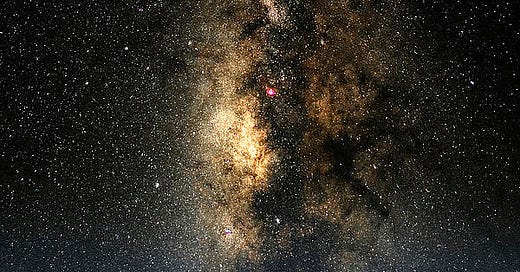For several years, Gordon was the administrative assistant to the astronomy department where I was first a graduate student and then a research scientist. Owing to his father’s profession, Gordon traveled a lot as a child, and grew up in England, Belgium, Germany, and Russia. He was a connoisseur of European museums, he held dual degrees in military history and Japanese, and he spoke many languages fluently. Gordon was one of the most intelligent, knowledgeable, and educated people I knew.
I never really understood why someone with his prodigious knowledge and talents chose to work as an assistant to the assistant to the chairman of an astronomy department, but I’m glad he did.
Gordon and I met when I accidentally locked myself out of my office, and required his master key to get back in. Somehow, a friendship was forged in that moment. He and I visited daily in his office, and soon began a tradition of meeting weekly at a Korean restaurant to discuss history, Japanese culture, movies, politics, and just life in general. This tradition lasted for many years, literally to the moment he died, and in that time I learned so much from him.
In all his years serving the astronomy department, which he did exceedingly well, Gordon had been a keen observer of the professors, the scientists, the students, and all of their endeavors. He made arrangements for distinguished visitors, he organized meetings, he sat in on dissertation defenses to take official notes. I shouldn’t have been surprised when, not long before he became ill and passed away, he had amassed enough knowledge about us and our profession to write this meditation on what it means for astronomers to study the universe in which they inhabit.
Though Gordon had grown up in the Catholic tradition and believed in God, he wrote this piece from the perspective of the cosmos, from which the human endeavor of astronomy truly is a supreme act of chutzpah.
I hope you enjoy this as much as I did.
Astronomy in a Nutshell
If a flea paused in his epic journey through
the weave of the homespun trews of an ale-sodden
Hebrides husbandman, and bent its thoughts on the
grand design of the cloth, striving to grasp not just
the mechanics of the warp and weft of the loom,
but the overarching vision of the weaver, would
you be surprised?
If a single note in a symphony, battered and whirled
by woodwinds and violins, paused for a heartbeat
to consider and assemble a vision, not just of
the entire piece of music, but the conductor and
composer behind the oeuvre, would that raise an
eyebrow?
Yet, astronomers, the carbon of their cellular
structures the product of some helpless exploding star
aeons ago, look out upon the entire cosmos, and ponder:
niggling away at countless points of light, in
search of a reason for every detail of its component
weave of light and sound; every aspect of its overall
structure bent by their basilisk gaze. All the while,
swept along willy-nilly on a tiny dust-mote planet,
scorched by an incandescent sun, gnawing on other
carbon life-forms for their sustenance, and quenching
their thirst with dihydrogen monoxide and knowledge
(and maybe beer as well).
The cosmos, looking down on this, can only gasp in
amazement at the unmitigated intrepidity, the
sheer audacity, of these tiny beings and their
grandiose goals and dreams. And that courage, that
vision, in a nutshell, is astronomy.
— G. P. Orris






A little science of religion editing of another famous nutshell quote (in the same vein as Mr. Orris' eloquent observation):
“The cosmos (God/The Holy Spirit) is within us. We are made of star-stuff (God/Holy Spirit stuff). We are a way for the universe (Us) to know itself (God/Holy Spirit)”
― Carl Sagan (and me). Yes, we are audacious.